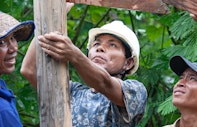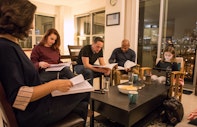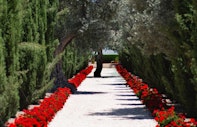What Bahá’ís Believe
Essential Relationships
The Individual and Society
The Community
- What Bahá’ís Believe
- Overview
- Bahá’u’lláh and His Covenant
- The Life of the Spirit
- God and His Creation
- Essential Relationships
- Universal Peace
- What Bahá’ís Do
Human beings were not created to live alone but, rather, to belong to communities. Collaboration with others is vital to our well-being and progress. “Some animals are isolated and lead a separate existence away from their kind,” said ‘Abdu’l-Bahá. “But this is impossible for man. In his life and being cooperation and association are essential. Through association and meeting we find happiness and development, individual and collective.”‘Abdu’l-Bahá, The Promulgation of Universal Peace
Communities can, of course, emerge out of various kinds of association, for example, the inhabitants of a village or neighbourhood, the followers of a religion, those associated with the life of an educational establishment, or the members of a profession.
In any given community, the culture it promotes, the attitudes it fosters, and the patterns of thought and behaviour it cultivates, are largely defined by its members’ collective sense of purpose. When that purpose is to contribute to the betterment of society, the community becomes a setting in which powers are multiplied in unified action, where individual will and collective volition are blended, and where the spirit of enterprise is reinforced by a realization of the need for concerted action and a commitment to the common good.
“The supreme need of humanity is cooperation and reciprocity,” said ‘Abdu’l-Bahá. “The stronger the ties of fellowship and solidarity amongst men, the greater will be the power of constructiveness and accomplishment in all the planes of human activity.”‘Abdu’l-Bahá, The Promulgation of Universal Peace In the same way that the human being is more than the sum of the individual cells which comprise its body, so too the powers of a unified community far exceed the combined powers of its individual members.
Bahá’ís live and work in tens of thousands of localities in every continent of the globe, and viewed together they can be said to represent the diversity of the entire human race. Wherever they reside, Bahá’í families and friends engage in efforts to apply Bahá’u’lláh’s teachings to the material and spiritual progress of their communities. In a mode characterized by a willingness to learn, they strive to contribute to a process of community building in which acts of worship and efforts to promote the common good are woven together. Everyone willing to participate in this process is welcome. Its purpose, after all, is to help raise the capacity of more and more people to take charge of their spiritual, social, and intellectual development so that they come to see themselves as active agents of both their own and their communities’ progress, rather than passive spectators of events beyond their control.
Notes
The supreme need of humanity is cooperation and reciprocity.







